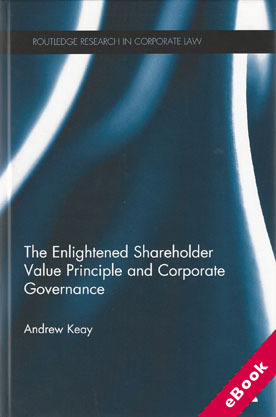
The device(s) you use to access the eBook content must be authorized with an Adobe ID before you download the product otherwise it will fail to register correctly.
For further information see https://www.wildy.com/ebook-formats
Once the order is confirmed an automated e-mail will be sent to you to allow you to download the eBook.
All eBooks are supplied firm sale and cannot be returned. If you believe there is a fault with your eBook then contact us on ebooks@wildy.com and we will help in resolving the issue. This does not affect your statutory rights.
The enlightened shareholder value principle (ESV) that was formulated during the comprehensive review of UK company law by the Company Law Steering Group in the late 1990s and early part of this decade.
ESV requires directors of companies to act in the collective best interests of shareholders, but rather than this resulting in a short-term approach to boosting the bottom line at all costs, it offers a more inclusive approach striking a balance between the competing interests of various stakeholders in order to benefit the shareholders in the long term.
The principle was taken up by the then UK Government and is now embedded in the Companies Act 2006. The emergence of the principle constitutes an important development in corporate governance, particularly in determining what directors have to take into account in managing the affairs of their companies.
The book explains and assesses the nature of ESV and its contribution to corporate governance. Andrew Keay traces the development of the principle of ESV and examines it in the context of existing principles which have influenced corporate governance. The book analyses the UK legislation that delivers the principle in corporate law, assessing the strengths and shortcomings of the principle as well as its impact on corporate governance as a whole.
ESV is compared to the constituency statutes that apply in the US in order to determine can whether anything can be learned from the American experience with these statutes. Finally the book considers whether ESV will mean a less short-termist approach by financial institutions and non-financial institutions after the global financial crisis.